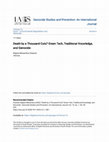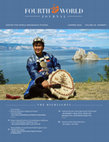Publications by Regina M . Paulose
American Bar Association International Legal Developments Year in Review: 2023, 2023
The Accountability, Politics, and Humanitarian Toll of the Rohingya Genocide, 2024
Our mission is to provoke principled and transformative leadership based on peace and security, g... more Our mission is to provoke principled and transformative leadership based on peace and security, global communities, character, stewardship, and development. Our purpose is to shape U.S. foreign policy based on a deep understanding of regional geopolitics and the value systems of those regions.
ABA International Law Section , 2024
The views expressed herein represent the opinions of the authors. They have not been reviewed or ... more The views expressed herein represent the opinions of the authors. They have not been reviewed or approved by the House of Delegates or the Board of Governors of the American Bar Association and, accordingly, should not be construed as representing the position of the Association or any of its entities.
Iran Human Rights - Transition, 2022

Genocide Studies and Prevention: An International Genocide Studies and Prevention: An International, 2022
Introduction 1 The current international focus on the environment, climate change, and our oceans... more Introduction 1 The current international focus on the environment, climate change, and our oceans has ushered in an urgency in thinking about "green tech," which is technology that can respond to environmental threats (such as carbon emissions) and generate "clean" energy. Hydropower, solar power, and wind power are different kinds of green tech that has found a new fan base given the current push to offset emissions. These particular technologies are mature compared to newer technologies such as wave power. 2 This article explores the destruction that has been left in the wake of green tech initiatives particularly on the lives of Indigenous Peoples (hereafter referred to as Peoples). Can green tech be considered a benign solution to environmental problems considering what its implementation requires and the horrific impact it has on Peoples? To answer this question the author will focus on the destruction taking place in the Sápmi or Sámi eanan, the traditional homeland of the Sámi Peoples. In addition to the persecution the Sámi have and continue to face over several decades, the author will focus on green tech and how it destroys knowledge systems like Traditional Ecological Knowledge (TEK), often considered a subset of Traditional Knowledge. TEK is passed down through generations and is a deep-rooted knowledge system often specific to Indigenous and Ethnic Minority Peoples and the continuation of their societies. The author concludes that the destruction of traditional homelands, such as the Sámpi along with the elimination of TEK, should be appropriately considered among the acts which constitute genocide. Green tech, cloaked as a sustainable solution to protect the environment, is actually another manner and method in which to destroy Peoples. Therefore, the elimination of Traditional Knowledge and its subsets must be considered when considering the actus reus of the crime of genocide. The author concludes that in order to prevent the further annihilation of Peoples, a specialized "Warning Signs" framework for genocide should be considered. TEK: Defined and Practiced The Contours of TEK Traditional Knowledge has been defined by the international community as "the knowledge, innovations and practices of indigenous and local communities around the world." A subset of 3 Traditional Knowledge is TEK, which is "the knowledge base acquired by indigenous and local The author would like to note that she is not part of, nor does she work for the Sámi Peoples. Since the Sámi were not 1 consulted regarding the writing of this article and its conclusions, it is entirely probable that the Sámi and other Indigenous Peoples mentioned here would not reach the same conclusions. All resources used to write this article are open source. Further, the author has made a concerted effort to use as primary sources direct from the communities impacted and Indigenous scholars as they are the knowledge holders. The author thanks and honors the leaders and academics who are from the Sámi communities, and academics from different Indigenous communities who are cited within this article. The author encourages anyone who wants to learn more about these issues to contact the communities in question.
Indian Journal of Projects, Infrastructure, and Energy Law, 2021
THE FUTURE OF ENVIRONMENTAL PEACEBUILDING, 2022
The Resolution Law Journal , 2020

Fourth World Journal , 2020
or Mecca." (Downing et al., 2002, p. 9) Within the course of the past decades, many achievements ... more or Mecca." (Downing et al., 2002, p. 9) Within the course of the past decades, many achievements have been made with reference to indigenous rights standards, primarily through indigenous engagement and dedication within global society. After 50 years of active participation in the global arena, indigenous rights movements continue to gain momentum transforming into one of "the most visible civil society grouping across the UN" (Morgan, 2011, p.2). As a result of adoption of international standards and guidelines in addition to the establishment more mobilized than any other time. With the notable exception (among the Arctic states) of the Russian Federation where despite a rather promising beginning of professional indigenous activism in the early 2000s, Russian indigenous groups saw even further division -yet more separate paths in contrast to international indigenous development (Eckert, 2012). While the protection of indigenous peoples' rights and interests is becoming an important global goal and the essential sphere of international cooperation, domestically there are still some fundamental imbalances in power, rights and inclusion of indigenous peoples in decision-making process.
People’s Tribunals, Human Rights and the Law, 2019
Groningen Journal of International Law, 2019
State Crime Journal, 2018
Britain and Germany had expansive colonial agendas in Africa from the mid to late 1800s, and both... more Britain and Germany had expansive colonial agendas in Africa from the mid to late 1800s, and both the British authorities in Kenya and the German authorities in Namibia were responsible for the commission of state crimes. This article explores reparations for state crimes committed during the colonial period and specifically examines how reparations should be afforded for crimes committed during colonization given the length of time that has passed. The authors focus on the cases of the Mau Mau and the Herero and Nama peoples and discuss present-day litigation and movements that have arisen from the commission of state crimes against these groups. The current framework for reparations is discussed, and a holistic and balanced formula that should be applied for those seeking justice for these state crimes is outlined.

Human trafficking is a multibillion dollar industry. It shows no apparent signs of slowing down d... more Human trafficking is a multibillion dollar industry. It shows no apparent signs of slowing down despite the increasing amount of resources which are allocated to combatting the crime. Top down approaches implemented by governments are not adequate. This article will explore how prosecution of this particular crime has proven difficult however; one approach that could disrupt networks is community prosecution. Community prosecution allows all stakeholders: the general community, civic organizations, faith communities, and business people to contribute to the wellbeing of their communities. As will be discussed throughout this article, community prosecution is the communion between local communities, law enforcement, and prosecutors to find resolution in novel and holistic approaches to difficult problems. This article will explore the current framework of combating human trafficking and then discuss what community prosecution is. The author will then highlight how community prosecution has been used in various contexts and the author will conclude by analyzing how community prosecution can contribute to resolving human trafficking challenges in local communities.

This article will focus on why transnational organised criminal groups need to be incorporated in... more This article will focus on why transnational organised criminal groups need to be incorporated into the law of war paradigm. States work under the continued assumption that wars are fought only between two parties. This 'us versus them' mentality obscures multiple parties that truly participate in war. This article will suggest that transnational organised crime groups participate in war thereby creating a third party on the battlefield because of their contributions before, during and after conflict. This article will explore how transnational organised criminal groups have positioned themselves to be allies to terrorists during conflict and how they benefit from regime changes in order to gain control at a later stage. This article will conclude with a discussion on how transnational organised crime groups could be classified as combatants in international humanitarian law, so that efforts to counteract their impact can be handled under more than one framework.











Uploads
Publications by Regina M . Paulose
examines crimes against the environment,
which impact not only humans, but also wildlife
and ecosystems more generally. A significant
point of discussion in the volume is whether
green crimes can fit effectively into existing
international criminal law frameworks or not.
Chapter authors explore these crimes from both
a definitional and theoretical perspective and in
various contexts in different parts of the world,
questioning whether these violations have led to
or are violations of international criminal law.
While the recognition of green crimes in the
international criminal law community has been
slow, it has increasingly gained widespread
attention. This volume acknowledges the growing
interest and seeks to promote debate among
academics and professionals working on the
subject. The aim of these texts is to encourage
meaningful action around green crimes within
the international criminal law community so that
environmental justice can become established.
The collection will be of particular interest to
practicing attorneys and academics studying
international criminal law, especially those keen on
investigating how green crimes can be incorporated
into the specific canon of international law.